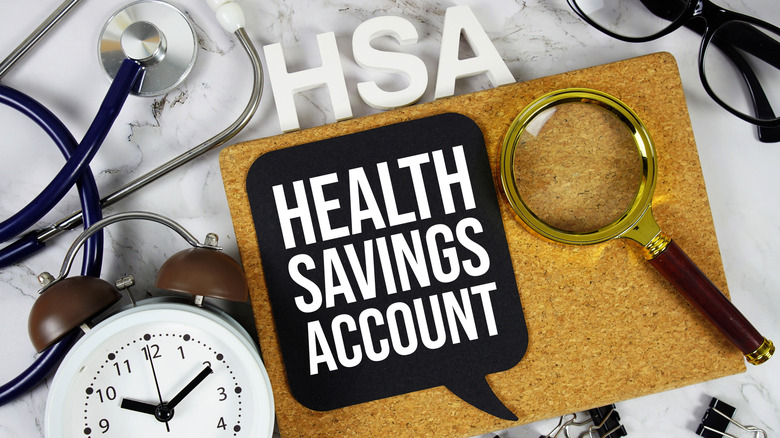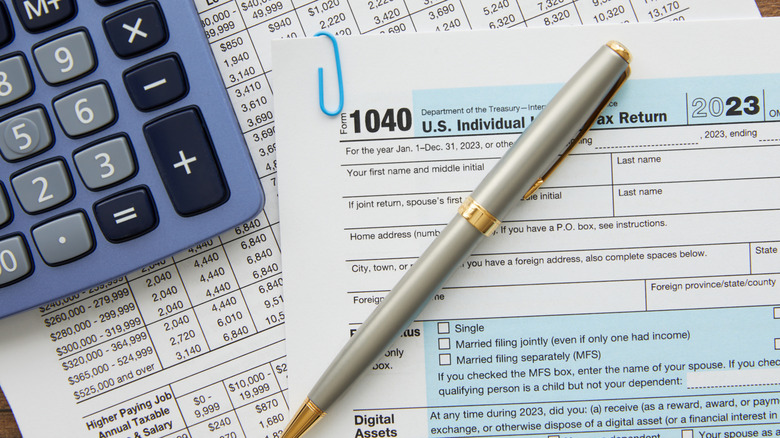Who Should Have An HSA Account And What It Means For Your Taxes
HSA plans are a key component of employee benefit packages. But while they are a great way to cover medical expenses and lower your taxes, they are not ideal for everyone. According to HealthCare.gov, an HSA plan, also known as a Health Savings Account, works like a tax-advantaged savings account that lets you use pre-tax income to pay for medically-related expenses like health care, vision care, dental care, and drug expenses.
To participate in an HSA plan, you must be enrolled in a high-deductible health plan, a type of health insurance plan which the IRS defines for the year 2025 as "a health plan with an annual deductible that is not less than $1,650 for self-only coverage or $3,300 for family coverage, and for which the annual out-of-pocket expenses (deductibles, co-payments, and other amounts, but not premiums) do not exceed $8,300 for self-only coverage or $16,600 for family coverage." Generally, high deductible health plans feature low monthly premiums but include higher out-of-pocket deductibles, making them smart plans for someone without major medical issues. The HSA component of this type of insurance plan, which allows your contributions to roll over year after year without expiring, helps to offset those high deductible costs.
There are a number of eligibility requirements for someone to enroll in an HSA in addition to being enrolled in a high-deductible health plan. These requirements include not being enrolled in another health plan, including Medicare, and not being claimed as a dependent of someone else.
HSA accounts can be used for a lot of things, but not everything
HSA plans are designed to help with out-of-pocket medical expenses and can make a big difference throughout the year, especially if you or your family members incur unexpected or costly medical-related bills. While the way you use the funds in your HSA account are able to be used at your discretion, it is ultimately the responsibility of the individual plan holder to ensure that the expenses are eligible medical expenses. An easy rule of thumb is to ensure the expense is something that is medically necessary, not something that is simply elective. You can use an HSA to cover medical expenses such as doctor visit copays, medical treatments not covered by your insurance, and an array of medical-related devices that are required to improve your functioning and maintain your quality of life, such as eyeglasses and dentures, as well as things like oxygen, wheelchairs, and crutches.
According to Fidelity, even though there are an impressive number of things an HSA can be used for, like postpartum care and health care-related travel, expenses that "don't meaningfully promote the proper function of the body or prevent or treat illness or disease" are not eligible to be reimbursed under one of these plans. In other words, things like nutritional supplements, weight loss supplements, and cosmetic procedures that are not considered medically necessary are not eligible, although if a doctor deems a procedure like weight loss surgery to be necessary to your overall health or a breast reconstructions surgery is related to cancer treatment, those procedures should qualify.
What are the tax implications of an HSA?
Saving money on your taxes is a big deal (check out these tips for finding more deductions), and HSA plans can be hugely beneficial. The money you contribute to your HSA plan is withdrawn directly from your check by your employer and is taken out pre-tax just like it is with money that you contribute to a 401(k), 403(b), or similar retirement plan. This allows you to lower your taxable income when it comes time to filing your tax returns. Make the most of your contributions as a means to lower your taxable income by ensuring you make your contributions before the yearly IRS filing deadline.
There are two important things to note when it comes to taxes and HSA plans. If you withdraw funds to pay for ineligible expenses, you will not only ultimately be taxed on that money, you will also pay a 20% penalty if you are under the age of 65. Additionally, for adults over 50, there are several tax breaks you can take advantage of, and one of them is the ability to increase your contribution to your HSA once you turn 55. Much like with an IRA, the government allows individuals 55 and over to contribute more as you near retirement by contributing an extra $1,000 per year to your HSA plan.


